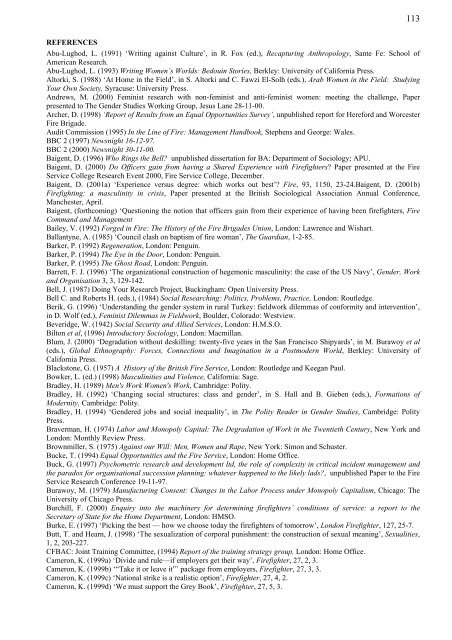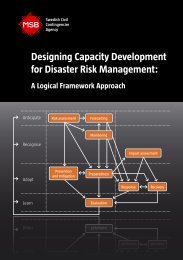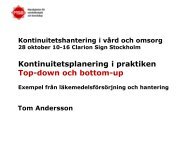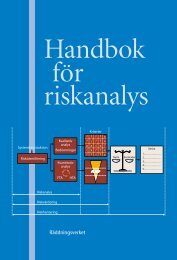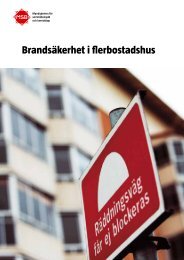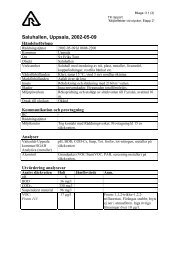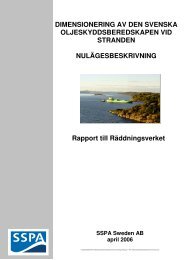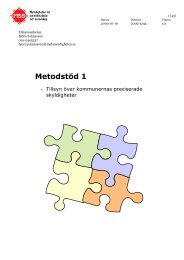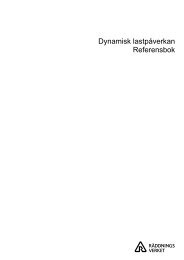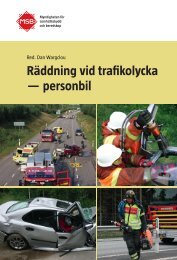One more last working class hero
One more last working class hero
One more last working class hero
You also want an ePaper? Increase the reach of your titles
YUMPU automatically turns print PDFs into web optimized ePapers that Google loves.
REFERENCES<br />
Abu-Lughod, L. (1991) ‘Writing against Culture’, in R. Fox (ed.), Recapturing Anthropology, Sante Fe: School of<br />
American Research.<br />
Abu-Lughod, L. (1993) Writing Women’s Worlds: Bedouin Stories, Berkley: University of California Press.<br />
Altorki, S. (1988) ‘At Home in the Field’, in S. Altorki and C. Fawzi El-Solh (eds.), Arab Women in the Field: Studying<br />
Your Own Society, Syracuse: University Press.<br />
Andrews, M. (2000) Feminist research with non-feminist and anti-feminist women: meeting the challenge, Paper<br />
presented to The Gender Studies Working Group, Jesus Lane 28-11-00.<br />
Archer, D. (1998) ‘Report of Results from an Equal Opportunities Survey’, unpublished report for Hereford and Worcester<br />
Fire Brigade.<br />
Audit Commission (1995) In the Line of Fire: Management Handbook, Stephens and George: Wales.<br />
BBC 2 (1997) Newsnight 16-12-97.<br />
BBC 2 (2000) Newsnight 30-11-00.<br />
Baigent, D. (1996) Who Rings the Bell? unpublished dissertation for BA: Department of Sociology; APU.<br />
Baigent, D. (2000) Do Officers gain from having a Shared Experience with Firefighters? Paper presented at the Fire<br />
Service College Research Event 2000, Fire Service College, December.<br />
Baigent, D. (2001a) ‘Experience versus degree: which works out best’? Fire, 93, 1150, 23-24.Baigent, D. (2001b)<br />
Firefighting: a masculinity in crisis, Paper presented at the British Sociological Association Annual Conference,<br />
Manchester, April.<br />
Baigent, (forthcoming) ‘Questioning the notion that officers gain from their experience of having been firefighters, Fire<br />
Command and Management<br />
Bailey, V. (1992) Forged in Fire: The History of the Fire Brigades Union, London: Lawrence and Wishart.<br />
Ballantyne, A. (1985) ‘Council clash on baptism of fire woman’, The Guardian, 1-2-85.<br />
Barker, P. (1992) Regeneration, London: Penguin.<br />
Barker, P. (1994) The Eye in the Door, London: Penguin.<br />
Barker, P. (1995) The Ghost Road, London: Penguin.<br />
Barrett, F. J. (1996) ‘The organizational construction of hegemonic masculinity: the case of the US Navy’, Gender, Work<br />
and Organisation 3, 3, 129-142.<br />
Bell, J. (1987) Doing Your Research Project, Buckingham: Open University Press.<br />
Bell C. and Roberts H. (eds.), (1984) Social Researching: Politics, Problems, Practice, London: Routledge.<br />
Berik, G. (1996) ‘Understanding the gender system in rural Turkey: fieldwork dilemmas of conformity and intervention’,<br />
in D. Wolf (ed.), Feminist Dilemmas in Fieldwork, Boulder, Colorado: Westview.<br />
Beveridge, W. (1942) Social Security and Allied Services, London: H.M.S.O.<br />
Bilton et al, (1996) Introductory Sociology, London: Macmillan.<br />
Blum, J. (2000) ‘Degradation without deskilling: twenty-five years in the San Francisco Shipyards’, in M. Burawoy et al<br />
(eds.), Global Ethnography: Forces, Connections and Imagination in a Postmodern World, Berkley: University of<br />
California Press.<br />
Blackstone, G. (1957) A History of the British Fire Service, London: Routledge and Keegan Paul.<br />
Bowker, L. (ed.) (1998) Masculinities and Violence, California: Sage.<br />
Bradley, H. (1989) Men's Work Women's Work, Cambridge: Polity.<br />
Bradley, H. (1992) ‘Changing social structures: <strong>class</strong> and gender’, in S. Hall and B. Gieben (eds.), Formations of<br />
Modernity, Cambridge: Polity.<br />
Bradley, H. (1994) ‘Gendered jobs and social inequality’, in The Polity Reader in Gender Studies, Cambridge: Polity<br />
Press.<br />
Braverman, H. (1974) Labor and Monopoly Capital: The Degradation of Work in the Twentieth Century, New York and<br />
London: Monthly Review Press.<br />
Brownmiller, S. (1975) Against our Will: Men, Women and Rape, New York: Simon and Schuster.<br />
Bucke, T. (1994) Equal Opportunities and the Fire Service, London: Home Office.<br />
Buck, G. (1997) Psychometric research and development ltd, the role of complexity in critical incident management and<br />
the paradox for organisational succession planning: whatever happened to the likely lads?, unpublished Paper to the Fire<br />
Service Research Conference 19-11-97.<br />
Burawoy, M. (1979) Manufacturing Consent: Changes in the Labor Process under Monopoly Capitalism, Chicago: The<br />
University of Chicago Press.<br />
Burchill, F. (2000) Enquiry into the machinery for determining firefighters’ conditions of service: a report to the<br />
Secretary of State for the Home Department, London: HMSO.<br />
Burke, E. (1997) ‘Picking the best — how we choose today the firefighters of tomorrow’, London Firefighter, 127, 25-7.<br />
Butt, T. and Hearn, J. (1998) ‘The sexualization of corporal punishment: the construction of sexual meaning’, Sexualities,<br />
1, 2, 203-227.<br />
CFBAC: Joint Training Committee, (1994) Report of the training strategy group, London: Home Office.<br />
Cameron, K. (1999a) ‘Divide and rule—if employers get their way’, Firefighter, 27, 2, 3.<br />
Cameron, K. (1999b) ‘“Take it or leave it”’ package from employers, Firefighter, 27, 3, 3.<br />
Cameron, K. (1999c) ‘National strike is a realistic option’, Firefighter, 27, 4, 2.<br />
Cameron, K. (1999d) ‘We must support the Grey Book’, Firefighter, 27, 5, 3.<br />
113


